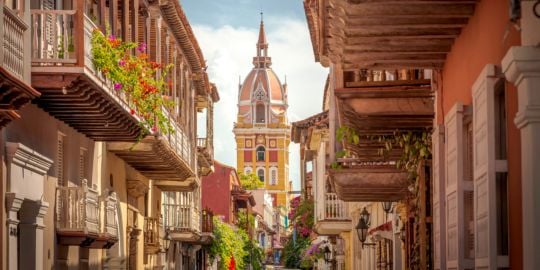Clarifying Tax on U.S. Expats in Colombia
Semana has a good article on the latest proposed Colombian tax changes in the new reforma tributaria.
The article was written by an international law firm in English. The title of the article is "Filing Personal Taxes in Colombia: A Comprehensive Guide". The guide is intended principally for resident or nonresident foreigners who happen to read English, which includes most Colombian expats. Of course, I doubt the majority of U.S. expats in colombia are real estate or business owners, but that is just a guess.He did not mention it was EXPATS. But in the context it was written, it was taken to be happening to expats. Maybe it was the Poster who posted the quotation, posted it in the wrong context. Maybe Mr. Langon never insinuated this.
Of course, those making the bare minimum on social security may not have to worry, but then getting a visa will be a lot more difficult, if not imposible, because of changing rules.
Also, the weaker peso means that the threshold for being to subject to the 19% marginal rate might be around $14,000 instead of $12,000.
Im curious if anyone knows if 401k or IRA account appreciation is taxed in Colombia, even though they are tax free in the US? I had an accountant who said the Dian doesn't recognize the tax benefits so any stock appreciation in such accts would be taxed as normal stock transactions which is a major bummer. They would also tax gross income, not after 401k allocation. Similarly he said that if you have stock carry forward losses those won't be considered by the DIan for tax purposes. Also, most deductions accepted in the US aren't recognized here. I'm hoping someone here can tell me he is wrong?
- @jmckenna71
Based on the report of the Reuters interview as e-published at www.cuencahighlife.com,
the Petro Administration's crackdown on tax evaders does not appear to be directed specifically at Expats.
Cheryl
Revista Semana is reporting that the minister of the interior told people in Cauca (famous for its land invasions) that they need to be ready to march if the congress doesn't pass the tax reform. Looking at a map, Medellin appears to the the city closest to the Cauca department. Do Medellin expats need to take on a bunker mentality like we have in Quito/Cuenca?
In reality Medellín is not at all close to the department of Cauca. Cauca is in the southwest of Colombia, Medellín is much further to the north, even farther north than Bogotá. By bus it takes over 18 hours (with stops) to get from Cali to Medellín and even longer from anywhere in Cauca.
In previous strikes and bloqueos the Minga indígena came up from Cauca to inflict damage on Cali which is fairly close. In today's newspapers I read that they have blocked the Cali-Popayán route - Popayán is the capital of Cauca and is less than 100 miles south of Cali.
I don't think they have anything to worry about in Medellín.
So much Chicken Little "The sky is falling" mentality amongst gringos.
I live each day as my last, travel, swim in the Caribbean waters off the Colombian coast, sail between the islands, hike the beautiful national parks in Colombia, camp in a tent with pouring torrential rains at night, take long road trips always starting/ending in my home in Medellin, have traveled as far south on road trips as Salinas Ecuador, so I owe some taxes, heck these are just digits on my banking laptop screen, paid my Colombian taxes last week, NOW it's done and never looked back as was the case in prior years.
Whats the fuss all about, none of us are guaranteed for tomorrow, live for today, stop the worry and stress.
And as Spock would say "Live Long And Prosper".
And yes (see photo) I covered every meter of the complete 800 km coastline of Ecuador, stopping at each seaside village and city and beach along the way, and this is just one of my many road trips through the whole of Colombia and Ecuador, Colombia has "become small" to me.
Happy weekend to all. 
It seems to me that we will be seeing major changes in the tax situation for expats or at least potentially so. I will be in CCC's camp and avoid ownership of major assets in Colombia with the possible exception of a vehicle. Some of my perceptions are as follows.
- There is no joint income tax filing in Colombia; so, would take US taxes and split it down the middle as a basis for Colombia filing.
- So does Colombia require that I share my income tax form from the US with them? If not how would they know my data other than the kindness or stupidity of my own account. In particular as to respects of real estate holdings (that might put one over the 5,000 million threshold).
- So if one had say 120,000.00 income for US taxes (Joint) each person would have a 60,000 base of taxable income of which any thing over the 4,100 UVT's would be taxed at 33%, not taking into account deducting US taxes paid.
Does this approximate your understanding of the tax system in Colombia?
I am still working on wrapping my head around the whole Patrimonio and world wide taxes idea.
I also wonder if one can adjust your withdrawals and tax years such that one could tax income in years when you were not a tax resident of Colombia. Probably best to just not apply for a visa and avoid tax resident status. Sigh.
So much Chicken Little "The sky is falling" mentality amongst gringos.
I live each day as my last, travel, swim in the Caribbean waters off the Colombian coast, sail between the islands, hike the beautiful national parks in Colombia, camp in a tent with pouring torrential rains at night, take long road trips always starting/ending in my home in Medellin, have traveled as far south on road trips as Salinas Ecuador, so I owe some taxes, heck these are just digits on my banking laptop screen, paid my Colombian taxes last week, NOW it's done and never looked back as was the case in prior years.
Whats the fuss all about, none of us are guaranteed for tomorrow, live for today, stop the worry and stress.
And as Spock would say "Live Long And Prosper".
And yes (see photo) I covered every meter of the complete 800 km coastline of Ecuador, stopping at each seaside village and city and beach along the way, and this is just one of my many road trips through the whole of Colombia and Ecuador, Colombia has "become small" to me.
Happy weekend to all.
-@South American Voyager
Well said my friend! We are the lucky ones to be able to live in this tropical paradise!
@Lpdiver
so, would take US taxes and split it down the middle as a basis for Colombia filing.
Considering you are from a community property state (Louisiana) in the U.S., I can see why you would want to do it that way. Of course, if you stop being a Louisiana tax resident, does that make sense to the DINA (Colombian IRS)?
So does Colombia require that I share my income tax form from the US with them?
I don't think so, but according to James L., they may ask to see a copy of your 1040 during your visa renewal or during a normal tax audit, at which time you will need to be like Harry Houdini and come up with one.
If not how would they know my data other than the kindness or stupidity of my own account. In particular as to respects of real estate holdings (that might put one over the 5,000 million threshold).
I don't think they will know anything more than what you freely provide to them as income in the qualifying phase of your visa or beyond.
So if one had say 120,000.00 income for US taxes (Joint) each person would have a 60,000 base of taxable income of which any thing over the 4,100 UVT's would be taxed at 33%, not taking into account deducting US taxes paid.
Does this approximate your understanding of the tax system in Colombia?
At some point, you may stop being a tax resident of Louisiana, although if that real estate you own is in Louisiana, you would still have to file at least a non-resident tax return for Louisiana. In that case, I would think your Colombia filing would be similar to someone who moves to a common law state in the United States and files their 1040 as "married filing separately", which is permitted by law. It is plausible that you would report your social security/pension income separately from your wife. Of course, joint real estate holdings would probably be split evenly. As for taking a deduction for U.S. taxes paid, it would most likely be a credit for U.S. taxes paid, which is better anyway.
I also wonder if one can adjust your withdrawals and tax years such that one could tax income in years when you were not a tax resident of Colombia. Probably best to just not apply for a visa and avoid tax resident status. Sigh.
-@Lpdiver
Considering the U.S. currently has favorable long-term capital gains rates, I would probably want to recognize those in the years that you are not a tax resident in Colombia.
P.S. What can be a can of worms is if you maintain a Louisiana address for all your income sources, despite not living there one day of the year. I am sure you could justify it, but you will receive inquiries from the Louisiana Dept of Revenue.
The five rules to keep Expat taxes
from getting out of hand in Colombia.
-- Don't buy land, a house, a pricey car
or other assets of high value in Colombia.
-- Contact five Colombia tax accountants or
tax attorneys to get an idea of what your
income tax obligation to Colombia will be.
-- Decide whether it makes sense for you
to live in Colombia more than about
180 days a year.
-- Don't make any moves or say anything
on the record that will get the attention of
La DIAN or any government agency in
Colombia. Maintain a low tax-profile.
-- Report back to this Colombia forum for
further advice or to anonymously share
your experiences to assist others.
cccmedia (178 days In Colombia this year)
@N.Barley Not a tax resident or resident period of Louisiana.
@cccmedia Are you saying you would take a 50% penalty in lieu of taking the RMD?
lpd
I'm sure I'm not saying that. I'm not willingly
accepting any penalty that enters into the picture
based on current information.
Out of curiosity, LPD, how much do you figure is
the RMD or required minimum distribution?
And this would be a distribution from what?
My IRA is a Roth, so I anticipate no distribution
penalties on that going forward, especially since
I don't intend to take money out of my IRA in
the foreseeable future.
cccmedia
Both these sources say that Roth IRAs have NO Required Minimum Distribution (RMD) for the original holder - the RMD is only for traditonal IRAs and 401k plans. In any case the RMD is usually quite modest.
https://www.investopedia.com/roth-ira-r … md-4770561
You didn't state Roth IRA, you simply said IRA. It is correct that Roth IRA's have no minimum distribution as they are funded with after tax funds. I have a mixture of traditional and Roth IRA's myself so I am familiar.
lpd
Hello. I am been working towards retiring early to spend time with my elderly parents in Colombia (I'ma dual citizen). Most of my money is in 401k and Roth IRAs. I'm very worried about the wealth tax (patrimonio). Do you know if IRA and 401k balance counts against that? There is no way I can afford to retire earlier and pay 1% of my retirement accounts balance + income on roth distributions, etc 
@mtbe Hello. I think you may have answered some questions I've had and are giving me nightmares. Do you mind letting me know if my understanding is correct?
1. 401k and IRA balances do not count towards wealth tax bet worth (patrimonio) and are not subject to wealth tax. Does that change for roth contributions on either?
2. Distributions from those accounts will be taxed as income even if they are exempt in the US (e.g., ROTH)
Is this correct? If I have to pay wealth tax on my retirement accounts, I'll have to work 10 more years or so, and I ain't no spring chicken. My whole family is in Colombia so already in the dian's radar 🤷♀️ Thanks so much. Muchas gracias!
Cristy, you worry way too much. I dont know anybody that reports their world wide asssets to DIAN, and I dont think I know anyone who reports their true world wide income to DIAN
And I know dozens of EXPATS, some very rich, that have been here many years.
You can spend hours and days searching on the forums , reading and doing your own personal interpretation of the tax rules online and talking to 2 bit local accountants for the best interpretation of what is legally required, or pay Deloite Touche or PWC , who both have Colombian offices and personnel, and understand the fine details, $10,000 US minimum for their interpretation.
Or you can relax and enjoy Colombia, and your parents, and dont worry about the issue until it happens, (if it ever does)
@mtbe Hello. I think you may have answered some questions I've had and are giving me nightmares. Do you mind letting me know if my understanding is correct?
1. 401k and IRA balances do not count towards wealth tax bet worth (patrimonio) and are not subject to wealth tax. Does that change for roth contributions on either?
2. Distributions from those accounts will be taxed as income even if they are exempt in the US (e.g., ROTH)
Is this correct? If I have to pay wealth tax on my retirement accounts, I'll have to work 10 more years or so, and I ain't no spring chicken. My whole family is in Colombia so already in the dian's radar 🤷♀️ Thanks so much. Muchas gracias!
-@Cristy1977
My wife and I recently spoke with a Tax accountant in Colombia and based on our discussion 401k and IRA do not count towards a wealth tax as you stated. You will have tax liability on 401k or IRA distributions or social security, if you are a permanent resident, staying over 180 days. Also agree with others that it is hard to get answers to these questions and you might get different answers depending on the tax accountant in colombia. If you are not staying over the 180 days or whatever it is you would only have tax liability on colombian income, if you have any.
This is what was explained to us.
People who read this thread deserve answers that can be backed up. That's why I always try to point to government and other trusted sources, with links and explanations - not just my conjectures, or "I heard my friend's sister's accountant said such-and-such"...
You as an American do not become a tax resident of Colombia unless and until you stay in-country more than 183 days in any given 365-day period not necessarily a calendar year. There are also some situations if you are a Colombian, where you may also be considered a tax resident even if you do not meet the more-than-183 days requirement. The Colombia tax agency, DIAN, explains all this here:
https://www.dian.gov.co/impuestos/perso … dente.aspx
For the income tax, only INCOME is counted - not assets. Your Roth IRA or 401K or other holdings are not income, until money is distributed from them to you.
The wealth tax on assets, the impuesto al patrimonio, goes into effect if you have reported assets of more than 72,000 UVT for 2023 - that's 3,053,664,000 COP, at today's exchange rate that's about $656,902 USD - which is not nearly as much as it used to take.
https://www.gerencie.com/impuesto-al-patrimonio.html
In Colombia knowing the law is not enough - the country has one of the most dense and impenetrable bureaucracies in the world and they are a law unto themselves. You must talk to several different tax specialists and pick one who has the best answers - and even then it may not turn out as it should.
The bottom line is if you are or plan on becoming a fiscal resident for tax purposes in Colombia, you should do all you can legally to minimize both your income and assets. Tax evasion is illegal; tax avoidance is not.









